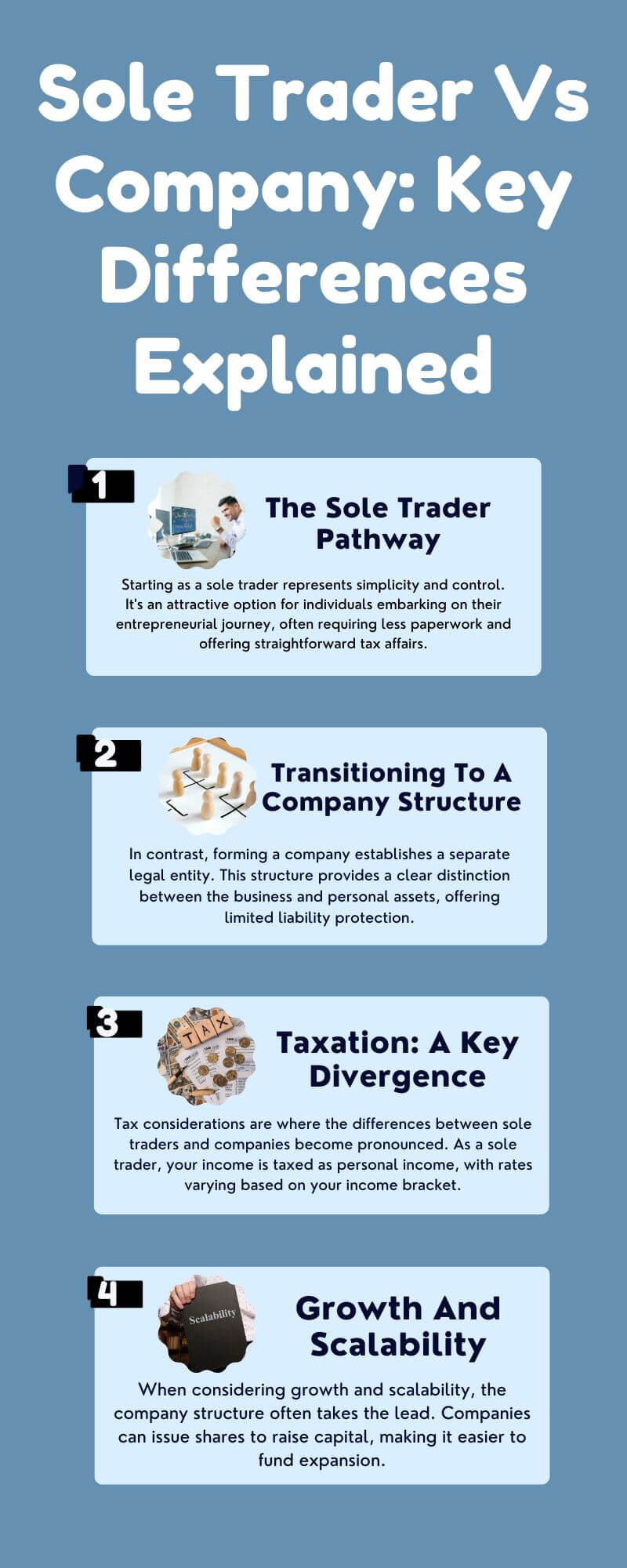Navigating the business landscape often starts with a crucial decision: choosing between operating as a sole trader or establishing a company. This choice significantly impacts how you manage your business, your personal liability, taxation, and growth potential. Understanding the nuances of each structure is essential for Australian entrepreneurs.
The Sole Trader Pathway
Starting as a sole trader represents simplicity and control. It’s an attractive option for individuals embarking on their entrepreneurial journey, often requiring less paperwork and offering straightforward tax affairs. As a sole trader, you are your business. This structure means profits after taxes are yours, but so are all business debts and liabilities.

The ease of setting up and winding down a sole trader business is a significant advantage. However, this simplicity comes with the caveat of unlimited liability. If your business runs into financial trouble, your personal assets could be at risk.
Transitioning To A Company Structure
In contrast, forming a company establishes a separate legal entity. This structure provides a clear distinction between the business and personal assets, offering limited liability protection. A company’s existence doesn’t depend on its directors or shareholders, making it a preferable choice for businesses planning long-term operations or seeking investment.
Also Read: Can Sole Traders Have Employees?
Setting up a company involves more complexities and costs than being a sole trader. You’ll face stricter reporting requirements, compliance obligations, and the need to understand corporate governance. Despite these challenges, the benefits of limited liability and potential tax advantages often outweigh the initial hurdles for growing businesses.
Taxation: A Key Divergence
Tax considerations are where the differences between sole traders and companies become pronounced. As a sole trader, your income is taxed as personal income, with rates varying based on your income bracket. This situation can be beneficial in the early stages when profits are low.
In contrast, companies are taxed at the corporate tax rate, which is generally lower than the top personal tax rates. However, extracting profits from the company typically involves dividends, which are taxed again at the individual’s tax rate, leading to double taxation.
The SoleApp: A Boon For Both Structures
In the midst of these differences, technology plays a unifying role. SoleApp, an innovative tool designed for Australian businesses, supports both sole traders and companies. This app simplifies financial management, from invoicing to tax preparation, making it a valuable asset for any business structure.
For sole traders, SoleApp streamlines accounting processes, allowing them to focus on growth without being bogged down by financial complexities. Companies benefit from its robust features, enabling efficient management of larger-scale financial operations. The app’s focus on the Australian market ensures compliance with local tax laws, a boon for businesses navigating the intricate landscape of Australian taxation.
Growth And Scalability
When considering growth and scalability, the company structure often takes the lead. Companies can issue shares to raise capital, making it easier to fund expansion. This structure also tends to instil more confidence in potential investors and clients, often seen as more stable and professional than a sole trader setup.

Sole traders, on the other hand, may find scaling up more challenging. Raising capital often relies on personal finances or loans, and the perception of being a ‘one-man band’ can sometimes limit opportunities.
Decision-Making And Control
The allure of being a sole trader often lies in the autonomy it offers. You’re the sole decision-maker, giving you agility and freedom to pivot your business as needed. This control can be empowering but also isolating, especially when facing complex business challenges.
Also Read: Digital Bookkeeping Guide For Australian Sole Traders
Company structures introduce a more collaborative approach. Decisions are often made by a board of directors or through shareholder votes, distributing the responsibility but also diluting individual control. This setup can bring diverse perspectives and expertise but may lead to slower decision-making processes.
Liability And Risk Management
The aspect of liability is a crucial factor in the sole trader vs company debate. Sole traders bear the brunt of all business liabilities personally, which can be a significant risk, especially in industries prone to litigation or heavy debts.
Companies offer the protection of limited liability, safeguarding personal assets from business failures. This protection is a critical consideration for businesses in risky ventures or those requiring significant investment.
Compliance And Administrative Responsibilities
Compliance and administration present a stark contrast between the two structures. Sole traders enjoy minimal reporting requirements, making administration relatively straightforward. This simplicity can be a significant time and cost-saving aspect.
Companies face more rigorous compliance and reporting standards, including annual reviews, financial statements, and corporate governance obligations. These requirements demand more resources but also bring a level of discipline and rigour beneficial for business growth.
Choosing Your Path
Deciding whether to operate as a sole trader or a company hinges on various factors, including your business goals, industry, risk tolerance, and growth aspirations. While sole traders benefit from simplicity and full control, companies offer limited liability, potential tax benefits, and easier access to capital for growth.

Incorporating tools like SoleApp can ease financial management, regardless of your chosen structure, aligning with the evolving needs of Australian businesses. This choice is not static; many entrepreneurs start as sole traders and transition to a company as their business evolves. The key is to assess your situation continually and adapt as necessary, ensuring your business structure aligns with your long-term vision and goals.
Also Read: Evolution Of Expense Tracking: From Paper To Digital Solutions
Future-Proofing Your Business: Adapting To Change
In today’s fast-paced business environment, adaptability is not just an asset; it’s a necessity. Whether operating as a sole trader or running a company, the ability to pivot and respond to changing market conditions, technological advancements, and customer needs is critical for long-term success.
For sole traders, this adaptability often manifests in their ability to make swift decisions. Being the sole decision-maker allows for quick changes in strategy, whether it’s exploring new markets, adjusting pricing strategies, or adopting new technologies. However, this agility must be balanced with foresight and planning to ensure sustainable growth.
Looking for an accountant to help you kick your financial goals? Sole has teamed up with Accountants Direct to provide a market-leading offer to help you manage your finances and achieve sustainable growth. Learn more about the offer here.


